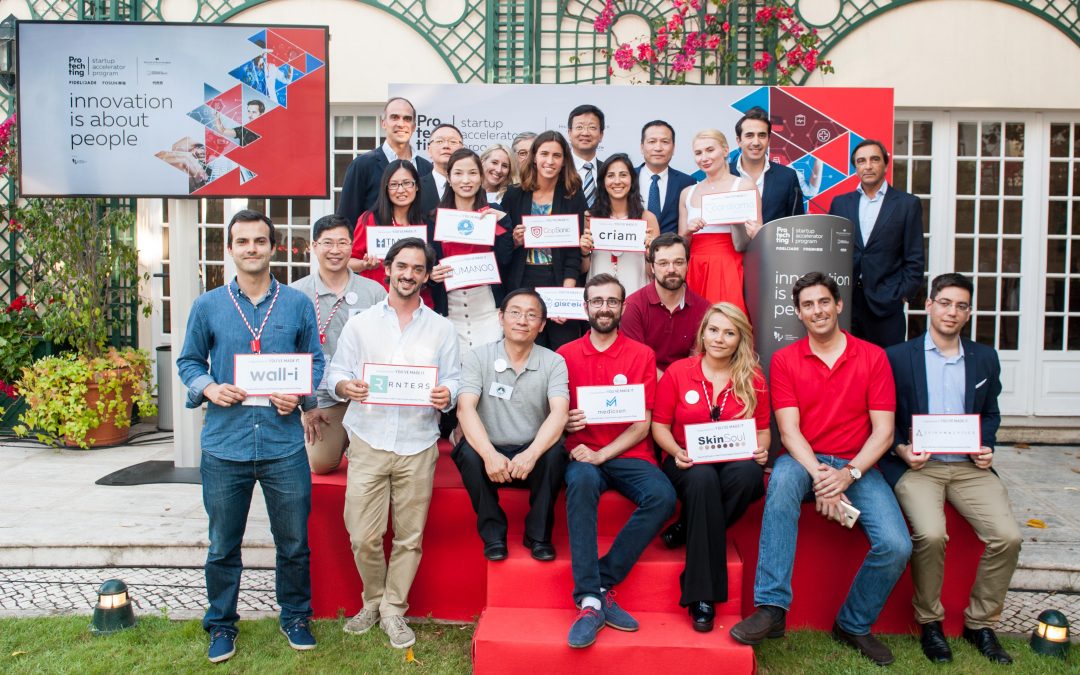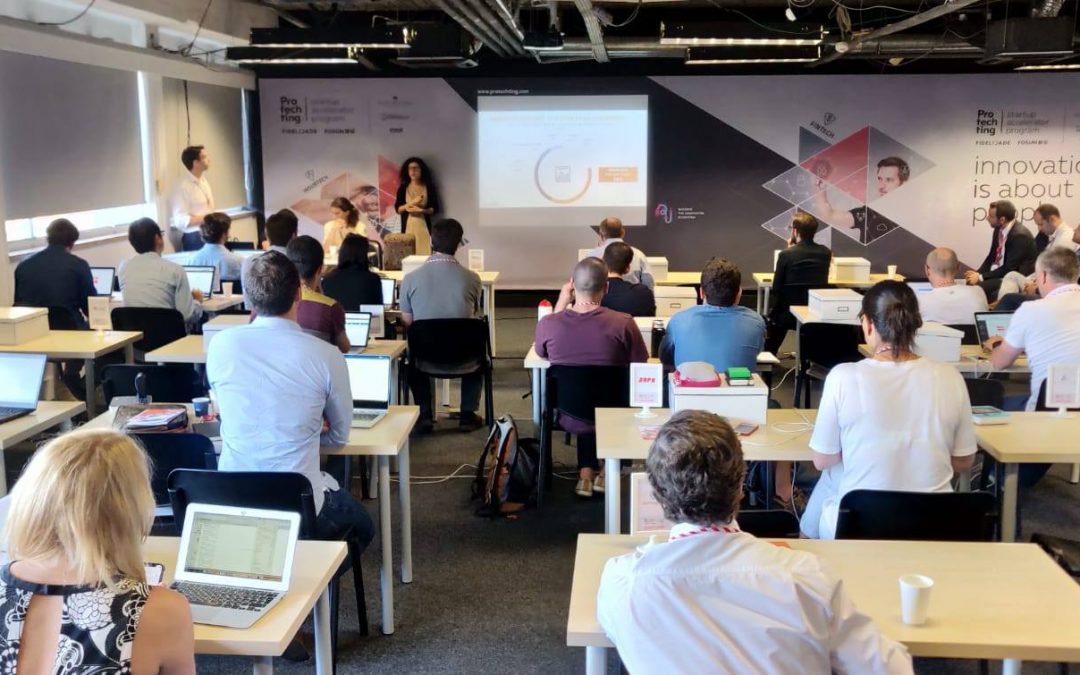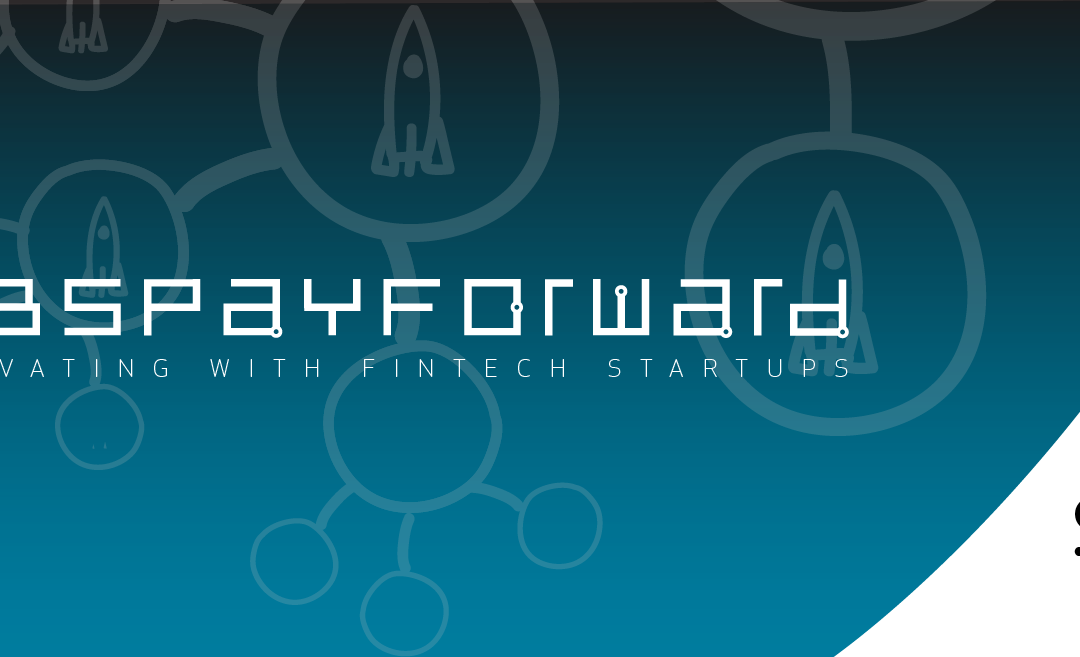
by Carolina Santos | Jun 25, 2018 | Startups
Last week I’ve been on the last day of Protechting’s bootcamp. It’s far from being my first one, but it was the first time I actually stopped to analyze them. Not to judge them, not to evaluate them, but to have their backs even without speaking. A lot of our startups come from abroad so their support system is far away.
I used to have this teacher back in college that said we all should go, at least once, to a club, to be completely sober and just observe, he said it was one of the richest sociological experiences he’d ever had. I never did it. But I’ve decided to observe people during a pitch day of an open innovation program, I pretty much minded their businesses without even knowing them.
For a week the startups share our building (Beta-i) but the whole team doesn’t have a close contact with them – we’re almost 60 people -, so we don’t get to know their dreams, their hopes, their fears. But if we stop for an hour to hear them pitch we can have an easy access to all of that. The beauty of pitching is that is someone on their most vulnerable state, trying to convince people they’re good, that they’re here to make a change and they know that unless they’re willing to put their heart, sweat, tears and nervous system on stage, they don’t stand a chance.
I learned that the more you understand and/or enjoy a certain kind of technology the more focused you are during the pitch and the more the nerves are insignificant to you. I have a soft spot for healthtech so, even though, I know for a fact they were all nervous it isn’t that easy for me to understand it and that made me realize that who’s evaluating can easily ignore the fact that their hearts are on their mouths on that stage.
Dry mouth, racing heart, moving hands frenetically are some of the stage symptoms, but it’s the differences that make them unique. Some decide to face the stage in pairs, others record their partner on stage. I may be extremely unfair here but I’d say portuguese and spanish are the ones who show more nerves on stage – this hot blood of ours doesn’t help our cause. The funny thing is that their posture changes from night to day as soon as their pitches end and the Q&A starts.
What do they all have in common? The relief when leaving the stage. For what they all go through, the pressure they put themselves under, my huge congratulations. All 23 were amazing – they always are.
However, from those 23 there were 12 moving forward, it’s not a matter of being better, it’s a matter of fitting better the needs of the client. And those are: SkinSoul, Criamtech, CopSonic, Humanoo, Wall-i, MedicSen, Gistek, BaylifeTech, TMASS, SpinAnalytics, Cardiomo and Rnters.
We’ll see each other soon.

by Carolina Santos | Jun 19, 2018 | Startups
After 157 applications from 35 different countries that included 15% focused on Insurtech, 28% on Fintech and 31% on Healthtech and after a selection process, Protechting is ready to receive its 25 finalists selected for the bootcamp.
Among the selected 23 there are 5 from Portugal, 5 from Spain, 4 from Germany, 3 from the UK, 2 from the US, 2 from Macau, 1 from Mozambique, 1 from Finland and 1 from France.
Meet them – even though just online – and know what they do:
- Medicsen (Spain) – Non-invasive artificial pancreas for diabetes: Predictive AI + smartpatch. It improves quality of life in the diabetic patients providing them with a personalized, automatic and non-invasive treatment, decreasing associated complications like blindness or amputations.
- HUMANOO (Germany) – Empowers people to achieve their personal health goals. How? With the help of e-therapists. They count with the support of 40 people from 10 different countries from creative minds, fitness freaks, physiotherapists, yoga gurus to food bloggers.
- SkinSoul (Portugal) – a technology that allows Medical Doctors (MD) from all specialties to screen for skin cancer their patients, with immediate feedback given by a tested AI system. Then the MD can immediately create a referral to the dermatologist. All in less than 2 minutes.
- Criamtech (Portugal) – CRIAM stands for Chemical Reaction Image Analysis for Mobility, a portable medical device that identifies the human ABO and Rh blood type and subtype within 3 minutes, and detects diseases. CRIAM represents a new methodology for blood phenotyping based on a cartridge (with the specific reagents for the test) and on image processing techniques to determine the occurrence of agglutination – between blood sample and reagent.
- Cardiomo (United States of America) – the mobile app serves as a display for vitals and metrics as well as a medication schedule reminder. It is also a communication center for user and designated observers — doctors, family, friends. When vitals go beyond normal range or the AI spots abnormalities in the EKG, there is a push notification to the user and/or observers stating the nature of the issue. This remote monitoring feature provides more precious time for rescuers in case of an emergency. The AI adjusts itself to each user thus providing more accurate diagnostics.
- Supaspot (United States of America) – Captures lifestyle data from GenZ using the SUPA App at sports and music events (brand partnerships) from IoT devices (wearables, mobile phone apps). GenZ continues using the SUPA App and captures data.
- Rnters (Portugal) – a peer-to-peer rental marketplace where users can rent or safely monetize any item. scene, there was no simple or safe alternative to purchasing a new board, which didn’t make sense for a casual traveller.
- Gistek (Spain) – Develops advanced and independent solutions in the insurance sector that improve their value chain through automation, standardization, interconnection, communication and confidentiality, always promoting simplicity of management, cloud computing, mobility, e-commerce, e-invoice, groupware, document management, systems interconnection and Business Intelligence.
- CopSonic (France) – A new, patented, universal contactless communication protocol enabling digital security, smart detection and IoT connectivity between electronic devices in either attended or unattended or automated mode. Not limited to smartphones, computers, connected devices and peripherals, other machines. Distributed through an SDK and white labelled applications, the solution can be integrated by B2B partners within their vertical activities and existing environments (applications, web sites, servers…) as a complement or alternative to state-of-the-art technologies such as NFC, Bluetooth or QR Codes which are currently suffering from the compatibility rate issues and poor UX on the end user side.
- Working Minds (Spain) – It delivers affordable, remote treatment and develops AI-based diagnostic tools for mental disorders.
- Senseitrade (Spain) – Their mobile-first investment platform seeks to democratize investing and targets demographics that have been priced out of investing on the stock exchange notably due to costly broker fees. It offers a user-friendly interface that makes it easy to search for companies that are trading on an exchange. The platform has no restriction around portfolio sizes and operates on a low-commission model so low value traders are not excluded. It offers smart alerts when relevant information is published on the internet or social media. So investors can make decisions in stock markets more informed.
- BillFront (Germany) – They make it easy for young and growing digital media companies to access funding by connecting to their accounting and invoicing systems and getting their receivables as security.
- CoinAnalyst (Germany) – It’s a software system that enables any trader in the crypto asset sector and other industries to access a dashboard which monitors and analyses real-time data from the crypto and ICO market. CoinAnalyst is based on the patented Cogia technology which uses semantic indexing and structuring of online data using pattern recognition and artificial intelligence. Additionally, the system provides news, price quotes and messaging. Similar to the information provider Bloomberg in the traditional financial market, they want to become the equivalent information provider in the crypto market – not exclusive like Bloomberg, but open for the mass market.
- Wall-i (Portugal) – Wall-I.TV is the most advanced cloud-based Digital Signage OS, able to provide segmented content for the audience consuming the information and versatile enough to be adaptable to the presentation of contents within different context requirements, taking advantage of the IoT’s opportunities for the widely spread of the technology within the context of Smart Out-of-Home (OOH) advertising, Smart Cities and Industry 4.0. It provides immediate deployment and setup within different media display contexts, audience metrics, insights and interaction, ambience monitoring, APIs for integration, and both big and small business reach.
- Spin Analytics (United Kingdom) – Brings digital transformation in Credit Risk Management by leveraging predictive analytics, AI and ML techniques on Big Data. It is a software framework that also implements and fully automates many modern sophisticated methodologies and algorithms used by the world leaders in the industries of Banking and Credit Modeling for effective Risk Management purposes and regulatory purposes.
- Reputation Transfer (United Kingdom) – Makes tools that pull the user’s data from sharing economy platforms upon request, having verified that the data is sourced from the correct accounts. The verification process doesn’t require either the user’s credentials or the exporting platform’s consent.
- Sharemy (United Kingdom) – The platform is based on a Shared Ledger framework which is underpinned by a machine learning & block chain model. Our focus is help enabled the users in the peer to peer market place to use our service to give them a on demand insurance service for peer peer transactions. Our mobile & desktop application is targeted at current and new peer to peer services where the renter/seller of that service need an on-demand insurance support/cover. Our second channel of focus is to offer the service to brands or retailers looking to enter the peer to peer marketplace, for examples tool manufacturers looking to rents tools versus buy them.
- LitigationCoin (Germany) – Provides legal tech solutions for litigation financiers on different occasions.
- B2Quant (Portugal) – It aims to explore the potential of automated quantification tools in the analysis of medical images. The starting point is QuantEmTool (QET), a quantification method developed within the context of a MSc thesis in Biomedical engineering. QET allows automatic segmentation of global brain volumes and FLAIR magnetic resonance imaging (MRI) sequence hyperintensities, and following calculation of brain atrophy and lesion load, particularly relevant indicators to multiple sclerosis follow-up. QET can also be of value in the follow-up of other neurodegenerative diseases, such as Parkinson and Alzheimer.
- Fjuul (Finland) – Provides a digital platform that enables insurers to offer digital smart insurance using real-time data to increase customer engagement and trigger preventive care rather than providing just pure risk coverage.
- Tech (Mozambique) – It’s a company launched completely for Mozambican people, where its own main goal is to generate applicable and innovative solutions to Mozambican needs. These solutions answer to needs in different sectors of society, based on Communication and information technology.
- TMASS (Macau) – It aims to provide revolutionary solutions for quantitative and qualitative analyses of protein molecules, which covers various aspects of human healthcare including “precision medicine”, “therapeutic protein drugs” and “medical cosmetology”. It strives to solve the issues of high cost, long development time, long turnaround time, low accuracy and poor quality control.
- Baylife Tech (Macau) – They’ve developed a groundbreaking technology that enables the storage of stem cells under room-temperature and oxygen-free conditions for more than 10 days with ensured cell viability and functions, thus saving costly cryopreservation equipment and the corresponding process.
The Bootcamp will run until June 22. Know more about the program here.

by Carolina Santos | Mar 14, 2018 | Startups
Fidelidade and Fosun launched the third edition of the startup acceleration programme – Protechting -, which aims to support the development of international projects that contribute to improve the protection of people in three strategic areas – Healthtech, Insurtech and Fintech.
Just like the other two editions, this third one will also be developed with the support of Beta-I, also with recently reinforced valences, allowing it to contribute in an even more efficient way to the innovation ecosystem.
As a result of the first 2 editions of this Open Innovation incentive programme, 6 startups, from 4 different countries, still maintain cooperation with Fidelidade Group and with Luz Saúde, contributing to the creation and implementation of innovative solutions.
This third edition is devoted to the promotion of international entrepreneurship and will present some innovations. Luz Saúde will reinforce its participation in the programme, and the German private bank Hauck & Aufhäuser, owned by Fosun Group, will integrate this project for the first time, seeking to attract technological innovation for financial services through Fintech.
The main goal is still to find more consistent startups to the programme and in order to do that international scouting initiatives will happen during the application phase, with partner entities and at entrepreneurship events specifically dedicated to Insurtech and Fintech, in London, São Paulo and Silicon Valley. The programme will also be presented during Startup Europe Week, taking place in Brussels, between May the 5th and 9th. Showing how far this programme has come and how much it grew.
The excitement among partners is understandable, not only because there’s new companies participating but also because every year they are able to reach more countries. And that is one of the reasons why it’s increasingly positioning itself as an internationally renowned acceleration programme.
Last year three startups were selected on the Pitch day and later went to China to participate in Protechting | Innostar. The good thing about this is that initially only one startup was meant to be selected to go to China, but they liked all three so much they couldn’t choose. So, we never know what might happen this year.

by Carolina Santos | Feb 6, 2018 | Corporates, Investors, Startups
First let’s start by explaining what is Regtech. A quick visit to Wikipedia will give you a kind of complex definition on Regulatory Technology it says it’s a new field within the financial services industry which uses information technology to enhance regulatory processes with the goal to tackle various regulatory problems, since it’s focused on regulatory monitoring, reporting and compliance benefiting the finance industry. This will make regulatory processes more transparent, consistent and standardized.
What this definition actually means is that regulatory technology helps banks meet regulatory requirements via technology and its exponential growth is mainly due to two reasons: the rapid development of FinTech, that has already proven its disruptive impact on financial services and the constant changes of financial regulation.
Regtech is here to produce efficient, cost-effective and innovative responses to regulatory demands. Until now financial institutions fought to keep up with new rules as well as understanding them, not to mention this was all done manually.
When Regtech first appeared in 2015 it was considered “a sub-set of Fintech”, now it has taken its own space and it’s rapidly separating itself from fintech. It is understandable why, banks don’t want to repeat the same mistakes from the past, the ones that took the financial system to collapse and some banks to bankruptcy, now, more than ever is important to manage risks, maintain the capital and create a more transparent financial sector.
According to International Banker “there are seven distinct areas within compliance and regulatory reporting that have the potential to be improved by regtech and those are: risk-data aggregation; modelling, scenario analysis and forecasting; real-time monitoring of payments transactions; identification of clients and legal persons; monitoring a financial institution’s internal culture and behaviour; trading in financial markets and identifying new regulations”.
All of the above are possible because of data analysis, machine learning and artificial intelligence. For example, Sybenetix, that was acquired by Nasdaq on September 2017, made behavioural analytics software to monitor individuals in financial institutions, looking out for things like unusual behaviour or suspicious activity that could be a sign of misconduct.
Some people believe regtech firms will start small but they’ll quickly grow and reach leading players in the market – Sybenetix is definitely a good example – this even before it reaches the masses, because when it does it’s a matter of months or a few years until it’s spread all over firm’s business strategies.
Regtech can be the next big thing, it matters and it’s extremely important and also won’t compromise Fintech place in the industry. Time will tell. But one thing is for sure is what we’re seeing right now is just the tip of the iceberg which means it’s a great business to invest in as well as a great business for a successful startup if you happen to have the skills.

by anunes | Dec 7, 2017 | Corporates, Startups
The use of APIs will accelerate the digital transformation of the financial landscape already sparked by the emergence of financial technology (or FinTech) companies.
Open Banking is just around the corner for European countries, with banks having to open up their data through application programming interfaces (APIs) by January 13 2018.
With public APIs, customers will have more options to interact with their bank. In this scenario, the bank will serve as a platform, on top of which third-party companies (such as startups) can build their own applications using the bank’s data to engage with customers.
Instead of doing all of their banking through one or two firms, customers will most likely have their current account with one provider and then aggregate financial services through other providers, all under the user interface of their choosing.
The Portuguese one-stop for all main banks data
In Portugal there’s an even more straightforward approach that will allow startups to access all main Portuguese banks data in a single platform instead of going to each bank API and adjust their solution in a case-by-case scenario.
Here, SIBS, the country main Fintech innovator, is already working together with the main banks to create an open API standard. This will mean for startups a one-stop access to the main Portuguese banks costumer data.
Startups will be able to build new products and services by accessing and integrating customer’s banking data – with their permission – into their applications.
But, more than this, startups can also have access to further support from SIBS in moving forward their solutions, including the co-development of new solutions, through the new edition of SIBSPAYFORWARD acceleration program, which as applications open until December 15.
Open door to deliver the Fintech Promise
For Fintech startups this changes mean an opportunity to fulfill their promise, the promise of groundbreaking technologies that will transform completely the financial landscape and the way consumers interact with financial products, by generating solutions that consumers will want to use in a widespread way.





